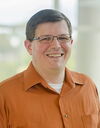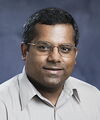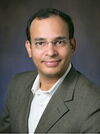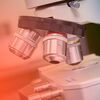2017-09-13
- The Vallee Foundation supports original, innovative, and pioneering work by early career scientists. Kehl-Fie is one of five scientists chosen from an international pool of candidates.
- 2017-09-07 - A new study, reported in the journal mSystems, contributes to understanding how vitamins may be used to modify or influence the microbial composition of the human gut.
- 2017-09-07 - Nair, a professor of biochemistry in the School of Molecular and Cellular Biology and director of the Center for Biophysics and Quantitative Biology, is a leader in studying how bacteria can make antibiotics and other medicinally relevant molecules.
- 2017-08-28 - "Intolerance, racism and violence...will never be condoned" in MCB or at Illinois.
- 2017-08-25 - A new study published in Development by Assistant Professor Eric Bolton and Research Associate Hyun-Jung Park reveals that glial cell line-derived neurotrophic factor (GDNF), which signals through activation of RET tyrosine kinase, inhibits androgen-induced development of the mouse prostate gland.
- 2017-08-23 - The Defense Advanced Research Projects Agency (DARPA) is funding the multi-investigator group focusing on eliminating influenza virus.
- 2017-08-17 - The findings are published in Proceedings of the National Academy of Sciences.
- 2017-08-10 - Epithelial cells build specialized cell-cell junctions to separate two different compartments. Many of these cell-cell junctions depend on the actin cytoskeleton for their assembly and maintenance. Graduate student Hui-Chia Yu-Kemp and colleagues identified CRMP-1 and EVL as novel factors necessary for assembling actin in epithelial cells. If either factor is perturbed, then actin filaments are...
- 2017-08-10 - The work is the cover story of the August issue of The Journal of Cell Biology.
- 2017-08-02 - The grant to Prof. Kalsotra provides $300,000 over a three-year period to study the molecular basis for cardiac arrhythmias in Myotonic Dystrophy, a multi-systemic disease that affects about 1 in 8000 people with no cure.
- 2017-08-01 - The National Science Foundation recently granted the University of Illinois $3 million for an interdisciplinary graduate student training program to help form new insight on the brain—and to expand participation in the field of brain science itself.
- 2017-07-31 - Professor Martha Gillette will lead the program to form new insight on the brain and expand participation in field of brain science.
- 2017-07-18 - Professor Aditi Das and biochemistry student Josephine Watson published findings in PNAS.
- 2017-06-27 - The findings, reported in the journal eLife, could assist in the development of therapeutics that promote healthy heart growth and prevent disease. Biochemistry professor Auinash Kalsotra, led the new study with postdoctoral researcher Sandip Chorghade and graduate student Joseph Seimetz.
- 2017-06-20 - The Allen Distinguished Investigator program supports early-stage research with the potential to reinvent entire fields.













